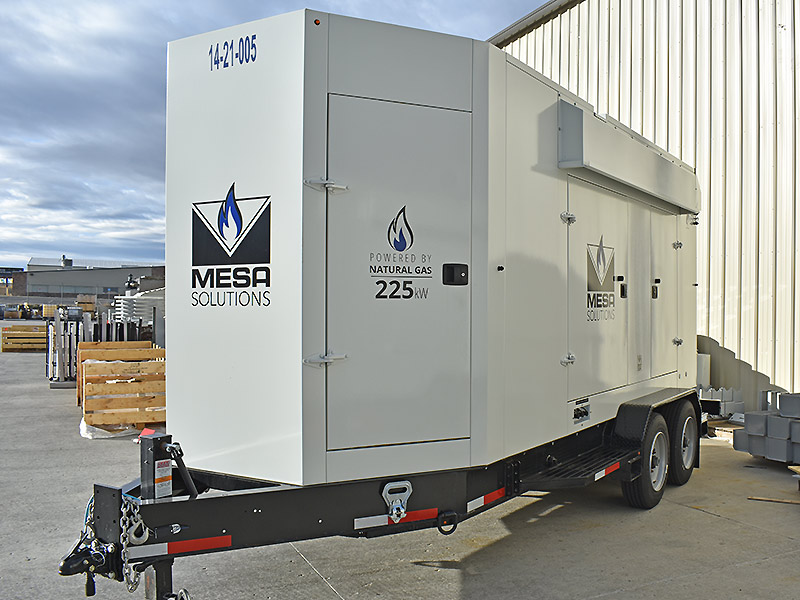
Natural Gas Generator
Businesses rely on steady electrical power sources to develop products, serve clients, and maintain operations. Unfortunately, the United States has an electric grid that’s weakening with time. Unplanned downtime can have a ripple effect that hurts revenues, brand reputation, and efficiency.
One study estimates that industrial manufacturers lose $50 billion annually to unplanned downtime. Although downtime costs vary from industry to industry, 25% of global enterprises say that server downtime costs $301,000 to $400,000 per hour.
Given the risks of losing access to electricity, commercial diesel generators and other backup power systems for businesses have become essential assets. When the grid fails, your generators provide the power you need to keep your business operational.
As you explore generator choices, diesel and natural gas fueled models are common options. Which should you choose? The answer depends on several factors, including upfront cost, fuel availability, reliability, and environmental concerns.
The Roles Generators Play in Business Success
Generators play an essential role during blackouts but also contribute to business success in other ways. For example, you might rely on a diesel or natural gas generator when:
- Your business needs to adapt to increased electricity needs beyond what your current grid connection can offer.
- You need to work in a remote location that doesn’t have access to the power grid.
- You have short-term construction projects and don’t want to take time connecting to the grid.
- You want to show potential clients you can provide ongoing services regardless of inclement weather, equipment failure, and other circumstances that might disrupt your grid connection.
Choosing Between Natural Gas and Diesel Generators
There isn’t a specific type of generator that will suit every business’s needs. Consider the following factors as you weigh the pros and cons of natural gas vs. diesel generators.
Fuel Availability and Storage
Depending on your location, you might find diesel or natural gas generators more convenient.
If you have access to a natural gas pipeline, you can connect your generator directly to the line. Ideally, this approach means you won’t need to plan for fuel deliveries or worry about running low at critical times. In reality, though, natural gas pipelines can experience disruptions. Gas pipelines often depend on the power grid to deliver fuel. When the grid goes down, there’s a chance you could lose backup power when you need it most. However, storing an emergency supply on-site can lower the risk of natural gas disruptions.
Commercial diesel generators don’t allow you to connect to a consistent source. Instead, you’ll have to purchase fuel from a supplier and have it delivered to your site. This option is ideal for many businesses, including those operating in remote locations.
Cost-Effectiveness
Natural gas generators tend to have a higher initial cost than comparable diesel-fueled generators. If you choose a natural gas generator, expect to pay about 50% more than someone buying a diesel generator.
Despite the higher upfront cost, investing in a natural gas generator could potentially save you money over time.
Historically, diesel fuel costs quite a bit more than natural gas. At the beginning of 2024, the national average price of natural gas was $2.95 per GGE, while diesel was $3.94 per gallon. The price gap was considerably wider in 2022, when the average price of natural gas was $2.76 per GGE, and the average diesel price was $5.02.
Given that the price of natural gas has almost always been lower than diesel, investing in a natural gas generator could save you money depending on how much you need to use it.
Environmental Considerations
Natural gas wins when it comes to sustainable power generation that produces fewer greenhouse gases. According to the U.S. Energy Information Administration (EIA), natural gas produces 116.65 pounds of CO2 per million BTU, while diesel produces 163.45 pounds of CO2 per million BTU.
Natural gas generators generally produce less noise pollution than diesel generators, making them the better option for worksites near residential and commercial areas. The specific decibel level will vary depending on the generator, enclosure, and exhaust system though, so it’s important to talk to an expert before choosing a model.
Reliability and Performance
Reliability and performance depend on much more than the type of fuel your generator uses. That said, most experts agree that in many use cases diesel engines are more reliable than industrial natural gas generators, especially when you use the generators frequently.
Regardless of the generator you choose, rely on preventative maintenance to keep it in top condition for as long as possible.
Get Help Choosing the Right Generator for Your Business
Choosing the right backup power option helps you avoid business interruptions, data loss, and equipment damage while saving money. Still not sure whether you’d benefit more from diesel or natural gas B2B power solutions? Contact Global Power Supply to talk to an expert who can weigh the pros and cons of models that match your business’s needs.